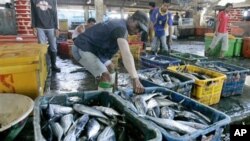In the sprawling Indonesian archipelago, months of bad weather have made life hard for fishermen. The past weeks have been especially difficult, so much so that the government has had to give relief to half a million fishermen who have been unable to go to sea.
Eight-year-old Ika pours a large bucket full of shellfish into a dish, and crouches down, knife in hand, to open them one by one.
Her father could not go to sea the day before because the waves were too high for his little wooden boat. There was no money for the bus fare to school, so on this day Ika helps her grandmother Habibah earn a few rupiah for the day’s meals by harvesting shellfish.
Life is hard in their fishing village, where mud and brick houses sit between expanses of industrial and empty land along Jakarta Bay. It is women like Habibah who shoulder the burden of finding alternative incomes when fishing is not possible.
"So basically I do whatever I can do to compensate for the situation of the extreme weather," explains Habibah. "A few days ago we had a small meeting with the ladies from this neighborhood. ‘Hey! Let’s do something else, make some chips.' But also, the biggest problem for us is that we need money to start this new business, and we don’t have it. So - basically - there’s not much we can do."
Times are hard for the three million Indonesian fishermen. Most of them, like those in Habibah’s village, are traditional fishermen whose little wooden boats capsize easily if waves reach two meters high.
Fishermen say the weather has been unusually rough for the past five years. But it has become particularly dangerous since last November, and the government weather center warns them not to go to sea until at least the end of the month as high waves are likely.
The situation worries Riza Damanik, the secretary-general of Karia, an organization that defends fishermen’s rights.
"In January 2011, we already got 20 fishermen who died or were lost at sea because of extreme weather. There are 550 000 fishermen in 53 districts in Indonesia who stopped their activities because of extreme weather," says Damanik.
Rustan, a fishermen from East Kalimantan, 1,000 kilometers from Jakarta, says there used to be two clear-cut seasons: one where the wind blows from the east, the other from the west. But nowadays seamen like him can not read nature’s signs anymore, and they have to take the sea at their own peril.
Rustan adds his town suffers from the men’s forced unemployment. It is difficult to get enough money to feed his nine children, and he really needs the government’s help to make ends meet.
The song of the wind chime dangling on Thiarom’s porch has glum overtones nowadays. It is his warning system telling him that the waves out in Jakarta Bay could easily swallow his boat.
Thiarom says that he and his fellow fishermen are back to zero. The knowledge he inherited from his forefathers is useless because everything is changing in Jakarta Bay: the direction of the wind, the strength of the waves, the course of the currents, the hideouts of the fish. He says that the government rice handouts are not enough: he wants a long-term solution to his problems.
Riza Damanik from the Karia group says that most fishermen work on small operations, and they need access to modern technologies to overcome the challenges posed by changing weather patterns.
"The government has weather information on their website but the problem is that the fishermen don’t have Internet access. So, how to make that information come to their home, that’s very important right now," says Damanik.
Thiarom says in the old days his grandfathers could harvest fish and shrimp with their bare hands in Jakarta Bay.
That is not possible now; mangroves are being destroyed and pollution taints the sea a foul brown. For him, the whims of nature are another blow to a struggling profession.
Indonesian Fishermen Struggle to Make a Living

Solenn Honorine reports from Jakarta.



